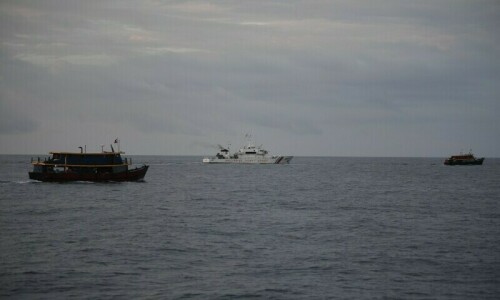LAHORE: Federal Minister for Planning, Development & Special Initiatives Asad Umar on Saturday reposed confidence in the private sector for Pakistan attaining economic viability in future.
“In the 21st century, I personally believe that only private sector-led development and growth can take Pakistan forward as the state-owned entities (SOEs) have failed to deliver except the period of 60s,” he said.
Speaking at a webinar titled ‘Role of the State in economic development’ organised by the Institute for Policy Reforms (IPR), the minister said that countries other than Pakistan passed through various experiences of development including SOEs. In the world of energy, the SOEs dominated the global energy market, he said.
Foreign expert asks Islamabad to study how South Korea became a leading exporter
“Look at Dubai. Its real estate sector has become the biggest sector of the country’s economic growth. In the UAE, airlines are still under state supervision. Look at China where seven of top 10 companies are being run by the state,” he explained.
However, he underlined, Pakistan’s experience does not seem good. “In the Musharraf-Shaukat Aziz era, PSO was revamped and it was the best performer in that period,” he added.
“In Pakistan, I have seen that only the private sector is the largest segment that has become the largest GDP contributor since it took risks to move forward. Most investment in the private sector was made in the IPPs (independent power producers),” he maintained.
Speaking on the occasion, eminent South Korean Economist Dr Ha-Joon Chang listed inconsistent, ineffective and non-sustainable policies and decreasing ownership SOEs that stopped Pakistan from moving forward with sustainable growth like various developed countries.
“Pakistan failed to develop and maintain the industrial production structure as built by South Korea, Japan and Taiwan. It couldn’t continue and use sustainable industrial policies as consistently adopted by these countries,” Dr Chang, who presently works for University of Cambridge as a reader in political economy of development, said.
Comparing Pakistan with various countries, Dr Chang said that in 1961, the country’s per capita income was just $4 less than South Korea which gained independence in 1945. “In 1961, Pakistan’s GDP per capita income was $89 while South Korea was slightly ahead with $93. It was this period when the Korean people were usually asked to go Pakistan and see its sustainable developmental growth,” he explained.
“Pakistan must study how a country (South Korea), which, after independence (for some years) used to export only fish and rice rapidly emerged as a leading exporter of cars, mobile phones and other technology based high-tech items in the world,” he said.
Talking about the role of SOEs, he said these entities played a vital role in taking economies of various countries to the top. The SOEs, he said, kick-started industrialisation in Germany (textile, steel) and Japan (steel, shipbuilding). The SOEs were also extensively used in France, Finland, Austria, Norway, Taiwan and Singapore in the post-World War-II period. SOEs share in Singapore’s GDP is 22 per cent.
SOEs, Dr Chang said account for only 1pc of the US GDP, but it has had one of the most successful SOEs in the human history.
IPR Chief Executive Officer Humayun Akhtar Khan said that Pakistan’s debt in last 20 years massively increased, forcing the governments to use one-third of the total budget for debts’ installments. “I suggest the state must play its role in strengthening the country’s economy by involving private sector, increase exports, create jobs for the workforce and provide an enabling environment for local and foreign investments,” he added.
Published in Dawn, July 11th, 2021














































